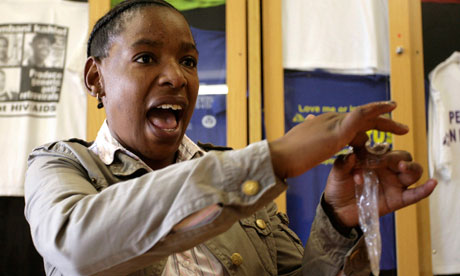
In South Africa, 15% of young women and 5% of young men aged 15 to 24 are HIV positive and 50% of new HIV infections are detected in people under 29.
Vuyiseka Dubula, general secretary of Treatment Action Campaign, blames poor access to contraception and HIV testing. She says sex education has been greatly improved in recent years, but schools must go further by making condoms and health advice available on site.
"Young people have to wait until school finishes to access health services, and then the clinics are shut," she says. And if young people do take time off school to go to a clinic, they could still be turned away because of lack of resources, she adds.
The South African department of health is soon to tackle this through the introduction of mobile health clinics. Eleven of these will be launched this year will test for HIV and other sexually transmitted infections. "The plan is for everyone to know their status. We hope that this will change behaviour," Dubula says.
Naomi Lince, from the reproductive health organisation Ibis, says alcohol abuse, violence against women and transactional sex (sex in exchange for food, money or shelter) are also major issues.
She says: "Young women often cannot negotiate condom use because they are reliant on men for money, food and shelter." One tenth of young women questioned for a 2005 study said they had been physically forced to have sex on at least one occasion.
There is also a problem with some staff at clinics ignoring government policy because it contradicts their own beliefs, Dubula claims. By law in South Africa the cut-off for abortions is 20 weeks, but she says Treatment Action Campaign workers often come across situations where nurses have refused to carry out terminations even before 12 weeks.
"Girls go to the clinic for an abortion and they are told, 'come back next week'. When they go back they are told 'come back next month'," she says. "The 12 weeks pass and they are told 'it is too late, now you must have the baby'.
"Partly this is because the clinics are too busy and partly it is because the nurses don't want to perform terminations. Termination of pregnancy is still a taboo."
She says young people generally don't have enough money to buy emergency contraception – if they even know it exists. "Life skills don't teach about the pill or the emergency pill, or where to get it," she says.
Betsi Pendry, executive director of Sexual Health and Rights Initiative, South Africa agrees.
"Policy in South Africa is good, but we are struggling to enact the policy, and much of the population is not behind the policy," she says. "Our teachers and our nurses have strong cultural norms and because of that some will refuse to supply birth control." .
This reflects the problem between the generations in South Africa, where the older generation is much more conservative. She adds: "Many young people don't know they have the right to contraception and abortion, and older people say: 'You're having sex, you shouldn't be. I'm not giving you access to contraception'."
Pendry says this is a "huge contradiction" because South African legislation is "very progressive". The problem, she says, is getting nurses and teachers to comply with the legislation.
South Africa's department of health has recently launched revised guidelines for family planning, reminding medical staff that all children over the age of 12 have a right to access birth control.

